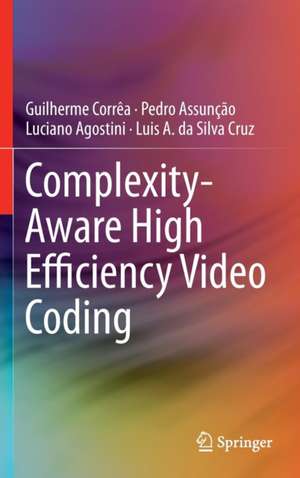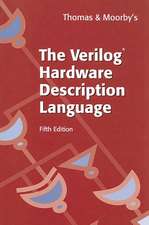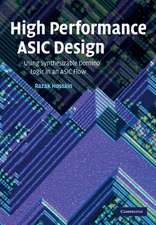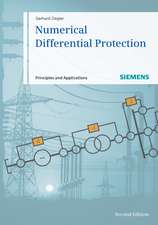Complexity-Aware High Efficiency Video Coding
Autor Guilherme Corrêa, Pedro Assunção, Luciano Agostini, Luis A. da Silva Cruzen Limba Engleză Hardback – 8 ian 2016
| Toate formatele și edițiile | Preț | Express |
|---|---|---|
| Paperback (1) | 385.47 lei 6-8 săpt. | |
| Springer International Publishing – 30 mar 2018 | 385.47 lei 6-8 săpt. | |
| Hardback (1) | 392.75 lei 6-8 săpt. | |
| Springer International Publishing – 8 ian 2016 | 392.75 lei 6-8 săpt. |
Preț: 392.75 lei
Nou
Puncte Express: 589
Preț estimativ în valută:
75.17€ • 78.27$ • 63.52£
75.17€ • 78.27$ • 63.52£
Carte tipărită la comandă
Livrare economică 10-24 martie
Preluare comenzi: 021 569.72.76
Specificații
ISBN-13: 9783319257761
ISBN-10: 3319257765
Pagini: 250
Ilustrații: XXII, 225 p. 131 illus., 47 illus. in color.
Dimensiuni: 155 x 235 x 16 mm
Greutate: 0.53 kg
Ediția:1st ed. 2016
Editura: Springer International Publishing
Colecția Springer
Locul publicării:Cham, Switzerland
ISBN-10: 3319257765
Pagini: 250
Ilustrații: XXII, 225 p. 131 illus., 47 illus. in color.
Dimensiuni: 155 x 235 x 16 mm
Greutate: 0.53 kg
Ediția:1st ed. 2016
Editura: Springer International Publishing
Colecția Springer
Locul publicării:Cham, Switzerland
Public țintă
ResearchCuprins
Introduction.- Video Coding Background.- State of the Art on Computational Complexity of Video Encoders.- Performance and Computational Complexity Assessment of HEVC.- Complexity Scaling for HEVC Using Adaptive Partitioning Structures.- Complexity Reduction for HEVC Using Data Mining Techniques.- Complexity Reduction and Scaling Applied to HEVC Encoding Time Control.- Conclusions.
Notă biografică
Guilherme Corrêa received the B.Sc. degree in computer science from the Federal University of Pelotas (UFPel), Brazil, in 2009; the M.Sc. degree in computer science from the Federal University of Rio Grande do Sul (UFRGS), Brazil, in 2010; and the Ph.D. degree in electrical and computer engineering from the University of Coimbra, Portugal, in 2015. He is currently a postdoctoral researcher with the Group of Architectures and Integrated Circuits (GACI) at the Federal University of Pelotas, where he researches on video coding algorithms, complexity-aware video coding and digital systems design.
Pedro A. Amado Assunção received the Licenciado and M.Sc. degrees in electrical engineering from the University of Coimbra, Portugal, in 1988 and 1993, respectively, and Ph.D. in electronic systems engineering from the University of Essex, UK, in 1998. He is currently a professor of electrical and computerengineering, electronics and multimedia communication systems at the Polytechnic Institute of Leiria and senior researcher at the Instituto de Telecomunicações, Portugal. His current research interests include UHD, multiview and plenoptic video coding, communications and processing, video codec complexity control and adaptation based on user-driven approaches, error concealment and quality assessment.
Luciano Volcan Agostiniis a professor since 2002 at the Federal University of Pelotas (UFPel), Brazil. Since 2013, Prof. Agostini is the executive vice president for research and graduate studies at UFPel, and since 2006 he leads the Group of Architectures and Integrated Circuits (GACI) at the same University. Prof. Agostini received the B.Sc. degree in computer science from UFPel, Brazil, in 1998 and the M.Sc. and Ph.D. degrees from the Federal University of Rio Grande do Sul, Brazil, in 2002and 2007 respectively. Since 2013, he was distinguished with a Researcher Productivity Grant from the Brazilian National Research Council (CNPq). His research interests include 2D and 3D video coding, algorithmic optimisation, arithmetic circuits, FPGA-based design and microelectronics.
Luis A. da Silva Cruzis a professor of electrical and computer engineering at the University of Coimbra and researcher with the Instituto de Telecomunicações, Portugal. He received an M.Sc. in information systems from the University of Coimbra in 1993; an M.Sc. in mathematics from the Rensselaer Polytechnic Institute, USA, in 1997; and a Ph.D. in electrical, computer and systems engineering also from the Rensselaer Polytechnic Institute in 2000. He researches at the Instituto de Telecomunicações, focusing on video processing and encoding, video codecs optimization and medical image processing.
Pedro A. Amado Assunção received the Licenciado and M.Sc. degrees in electrical engineering from the University of Coimbra, Portugal, in 1988 and 1993, respectively, and Ph.D. in electronic systems engineering from the University of Essex, UK, in 1998. He is currently a professor of electrical and computerengineering, electronics and multimedia communication systems at the Polytechnic Institute of Leiria and senior researcher at the Instituto de Telecomunicações, Portugal. His current research interests include UHD, multiview and plenoptic video coding, communications and processing, video codec complexity control and adaptation based on user-driven approaches, error concealment and quality assessment.
Luciano Volcan Agostiniis a professor since 2002 at the Federal University of Pelotas (UFPel), Brazil. Since 2013, Prof. Agostini is the executive vice president for research and graduate studies at UFPel, and since 2006 he leads the Group of Architectures and Integrated Circuits (GACI) at the same University. Prof. Agostini received the B.Sc. degree in computer science from UFPel, Brazil, in 1998 and the M.Sc. and Ph.D. degrees from the Federal University of Rio Grande do Sul, Brazil, in 2002and 2007 respectively. Since 2013, he was distinguished with a Researcher Productivity Grant from the Brazilian National Research Council (CNPq). His research interests include 2D and 3D video coding, algorithmic optimisation, arithmetic circuits, FPGA-based design and microelectronics.
Luis A. da Silva Cruzis a professor of electrical and computer engineering at the University of Coimbra and researcher with the Instituto de Telecomunicações, Portugal. He received an M.Sc. in information systems from the University of Coimbra in 1993; an M.Sc. in mathematics from the Rensselaer Polytechnic Institute, USA, in 1997; and a Ph.D. in electrical, computer and systems engineering also from the Rensselaer Polytechnic Institute in 2000. He researches at the Instituto de Telecomunicações, focusing on video processing and encoding, video codecs optimization and medical image processing.
Textul de pe ultima copertă
This book discusses computational complexity of High Efficiency Video Coding (HEVC) encoders with coverage extending from the analysis of HEVC compression efficiency and computational complexity to the reduction and scaling of its encoding complexity. After an introduction to the topic and a review of the state-of-the-art research in the field, the authors provide a detailed analysis of the HEVC encoding tools compression efficiency and computational complexity. Readers will benefit from a set of algorithms for scaling the computational complexity of HEVC encoders, all of which take advantage from the flexibility of the frame partitioning structures allowed by the standard. The authors also provide a set of early termination methods based on data mining and machine learning techniques, which are able to reduce the computational complexity required to find the best frame partitioning structures. The applicability of the proposed methods is finally exemplified with an encoding timecontrol system that employs the best complexity reduction and scaling methods presented throughout the book. The methods presented in this book are especially useful in power-constrained, portable multimedia devices to reduce energy consumption and to extend battery life. They can also be applied to portable and non-portable multimedia devices operating in real time with limited computational resources.
• Describes the state-of-the-art in computational complexity for HEVC;
• Discusses challenges related to the use of HEVC in complexity-constrained and power-constrained multimedia systems;
• Analyzes the efficiency of HEVC encoding tools and frame partitioning structures, in terms of compression efficiency and computational complexity;
• Enables the design of complexity-constrained and power-constrained multimedia systems, with a set of methods and their respective algorithms;
• Shows the applicability of the proposed methods in real-case scenarios.
• Describes the state-of-the-art in computational complexity for HEVC;
• Discusses challenges related to the use of HEVC in complexity-constrained and power-constrained multimedia systems;
• Analyzes the efficiency of HEVC encoding tools and frame partitioning structures, in terms of compression efficiency and computational complexity;
• Enables the design of complexity-constrained and power-constrained multimedia systems, with a set of methods and their respective algorithms;
• Shows the applicability of the proposed methods in real-case scenarios.
Caracteristici
Describes the state-of-the-art in computational complexity for HEVC; Discusses challenges related to the use of HEVC in complexity-constrained and power-constrained multimedia systems; Analyzes the efficiency of HEVC encoding tools and frame partitioning structures, in terms of compression efficiency and computational complexity; Enables the design of complexity-constrained and power-constrained multimedia systems, with a set of methods and their respective algorithms; Shows the applicability of the proposed methods in real-case scenarios.













